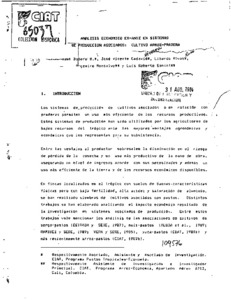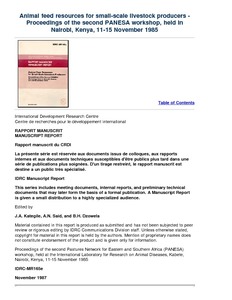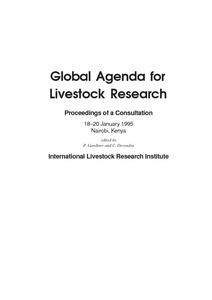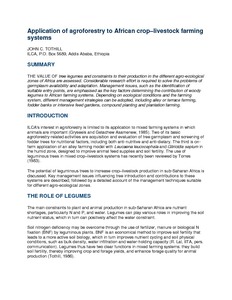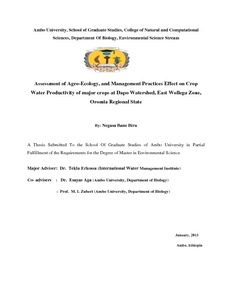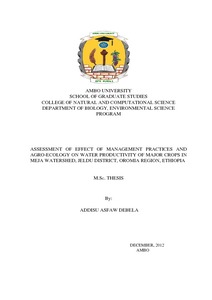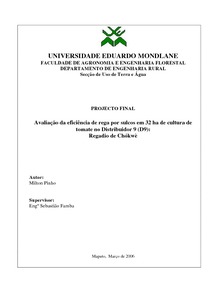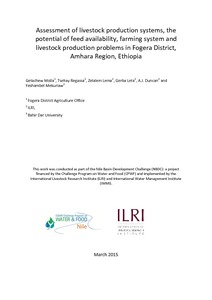Animal feed resources for small-scale livestock producers. Proceedings of the second PANESA workshop
Presents papers on inventory of animal feed resources in Kenya, Tanzania, Ethiopia, Zimbabwe, Malawi, Burundi, Madagascar, Botswana, Swaziland and Mozambique, research and development experiences in Kenya, Tanzania, Burundi and Zimbabwe; socioeconomic aspects of feed resources; and regional/sub-regional research programmes.
Animal genetics training resources: Capacity building for sustainable use of animal genetic resources in developing countries
This training resource is presented in five modules. 1) Global perspectives on animal genetic resources for sustainable agriculture and food production in the tropics. This module provides some insight into the need for better use of animal genetic resources (AnGR) in the context of projected demand for food in developing countries until 2020. 2) Improving our knowledge of tropical indigenous animal genetic resources.
Animal production systems in south-east and east Asia. Potential and challenges for research
Animal production systems in South-East and east Asia are discussed in the context of their potential and challenges for research to address poverty alleviation, increased food production and food security and environmentally sustainable development. The projected human population increase, rising incomes and changing consumer preferences will accelerate the demand for, and access to food in the future. This will place considerable pressures on the use of natural resources (land, crops and animals).
Application of agroforestry to African crop-livestock farming systems
Discusses the potential of leguminous trees to increase crop-livestock production in sub-Saharan Africa. Describes major management issues influencing tree introduction and contributions to the system. Gives a detailed account of the management techniques suitable for different agro-ecological zones.
Assessment of agro-ecology, and management practices effect on crop water productivity of major crops at Dapo Watershed, East Wollega Zone, Oromia Regional State
In Ethiopia food production lags behind while population growth increase, poor management of Soil and Water, poor agronomic practices and environmental degradation are wide spread. In the study area, agriculture depends on rain water; however rain water is not evenly distributed spatially and temporally. The general objective of the study is to assess agro-ecology, and crop management practices effect on crop water productivity of major crops.
Atlas de Yorito y Sulaco, Yoro (Honduras)
Assessment of effect of management practices and agro-ecology on water productivity of major crops in Meja Watershed, Jeldu District, Oromia Region, Ethiopia
Low water use efficiency is a challenge to crop production in Sub-Sahara African countries. Water is getting continuously scarce due to increased demand and shrinking availability induced mainly by climate change. As agriculture is the major consumer of water, improving crop water productivity is among the ways of overcoming the challenge. Crop production under rainfed system is the major livelihood strategy for smallholder farmers in Ethiopia.
Assessment of furrow irrigation efficiency in 32 ha of tomato in the Distributor 9 of the Chókwè Irrigation Scheme
Assessment of livestock production systems, the potential of feed availability, farming system and livestock production problems in Fogera District, Amhara Region, Ethiopia
Assessment of risk premium in farm technology adoption as a climate change adaptation strategy in the dryland systems of India
Assisting community management of groundwater: irrigator attitudes in two watersheds in Rajasthan and Gujarat, India
The absence of either state regulations or markets to coordinate the operation of individual wells has focussed attention on community level institutions as the primary loci for sustainable groundwater management in Rajasthan and Gujarat, India. The reported research relied on theoretical propositions that livelihood strategies, groundwater management and the propensity to cooperate are associated with the attitudinal orientations of well owners in the Meghraj and Dharta watersheds, located in Gujarat and Rajasthan respectively.

